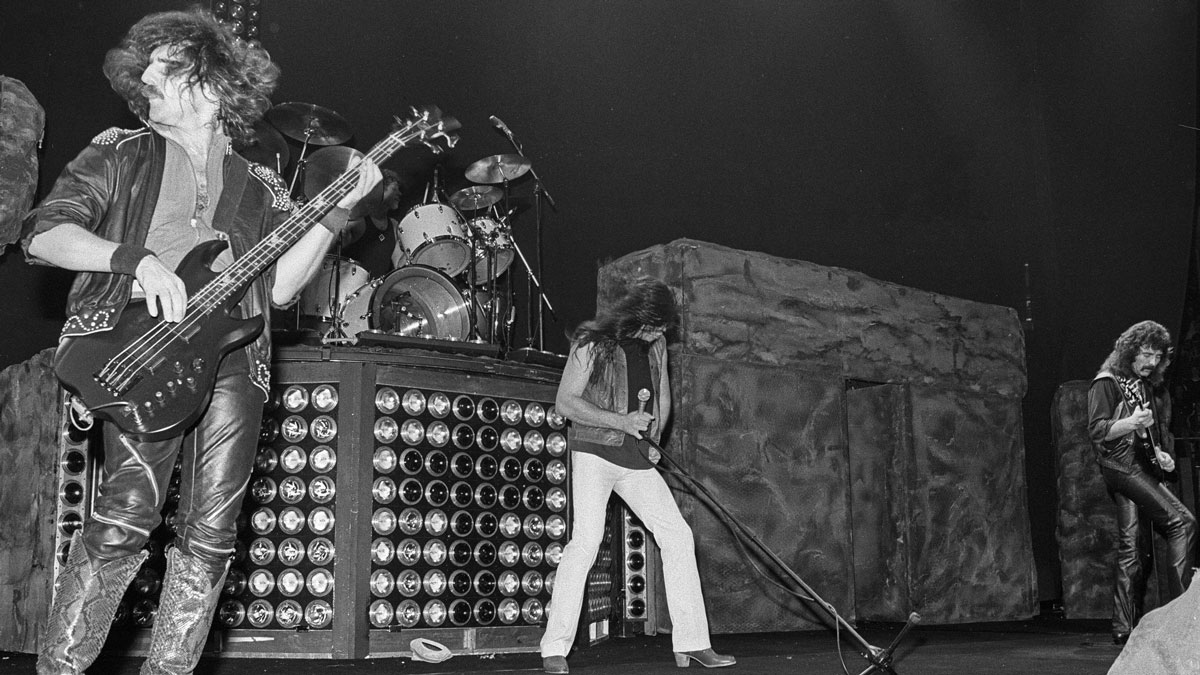“I don't know whether we played it properly, but the audience loved it”: When Black Sabbath regularly covered Smoke on the Water – and unwittingly inspired Spinal Tap's Stonehenge
Sabbath's ill-fated Born Again tour featured comically oversized props “as big as the real Stonehenge”, onstage spills, and a crowd-pleasing hard-rock crossover

It's no secret that Black Sabbath went through a litany of lineup changes during their near-50-year run as heavy metal's pioneers.
Though the band's music often shifted to accommodate the different strengths of those members who came and went – the vastly different, but equally powerful vocal styles of Ozzy Osbourne and Ronnie James Dio, for instance – rarely did it get as much of a jolt as when Dio left the group in 1982 and was replaced by then-former Deep Purple frontman Ian Gillan.
Gillan's bluesy singing and wry lyrics were, to put it mildly, a stark departure from Osbourne and Dio's respective styles as frontmen. Though the Gillan/Sabbath partnership ended after just one album (1983's Born Again), it did give us the unique spectacle of the godfathers of heavy metal covering one of hard rock's other giants.
During the Gillan-fronted tour in support of Born Again, Sabbath took to playing the song for which Gillan is most known, Deep Purple's none-more-classic Smoke on the Water, as an encore. Black Sabbath played the song over 60 times during the tour, which stretched from 1983 through the following year. You can hear a typically hard-edged version of it from the Born Again trek above.
“I suggested we play Smoke on The Water, because Ian was known for it and it seemed like a bum deal for him not to do any of his stuff while he was doing all of ours,” Sabbath electric guitar hero Tony Iommi recalls in his 2011 memoir, Iron Man: My Journey through Heaven and Hell with Black Sabbath. “I don't know whether we played it properly, but the audience loved it.”
Iommi would later cover the track again in 1989 with an all-star cast including Ritchie Blackmore, David Gilmour, Alex Lifeson and Brian May.
The Born Again tour was also notable in the band's history not only for this cover, but for the infamous 'Stonehenge' set the group ordered for the stage.
Get The Pick Newsletter
All the latest guitar news, interviews, lessons, reviews, deals and more, direct to your inbox!
Due to a misunderstanding between band and set designers, 'Stonehenge' ended up significantly different (larger, in this case) than the band envisioned.
Sound kind of familiar?
“When we were thinking about the stage set for our Born Again tour, Geezer [Butler, Sabbath's bass guitar player] said: 'Why don't we have something that looks like Stonehenge, you know, with stones and all that stuff?',” Iommi says in Iron Man.
“Geezer jotted down what it should look like and gave it to the designers. Two or three months later we saw it. We rehearsed for the tour at the Birmingham NEC and we said: 'Oh great, the stage set is going to come today!'”
You can probably guess the sight that greeted the band.
“It came in and we couldn't believe it. It was as big as the real Stonehenge,” Iommi remembers. “They had taken Geezer's measurements the wrong way and thought it was meant to be life-size. I said, 'How the bloody hell did that happen?'”
This is Spinal Tap simply took the legendary mishap and reversed it.
Though it's rather grainy, you can get a sense of the true enormity of the set – at least the pieces of it that Sabbath's crew could squeeze onto the stage – in the fan-filmed footage of the band's October 21, 1983 performance at the Forum de Montréal in Canada below.
Aside from set design mishaps, Gillan – in a different way than Sabbath's previous two frontmen – was also quite the showman onstage, and struggled to acclimate to other aspects of the band's onstage setup when engaging with the crowd.
Gillan, Iommi says, “once fell over my pedalboard. He was waving at the people, stepped back and, bang! He went arse over head big time.“
All things considered, the Born Again trek was a strange period for the heavy metal godfathers. Gillan departed soon after to join the reunited Deep Purple, while Sabbath (with a number of personnel shifts in between) would struggle both critically and commercially for a number of years, before reuniting first with Dio in 1992 and – a few years later – with Ozzy Osbourne, in their original permutation.
As for the fate of the Stonehenge props?
“At the end or the tour we tried to give it all away to the people who had bought London Bridge and reassembled it in Arizona, but they didn't want it,” Iommi reveals in Iron Man. “We couldn't take it back to England, so the crew dumped it off at the docks somewhere and left it. Just ridiculous.”
Jackson is an Associate Editor at GuitarWorld.com. He’s been writing and editing stories about new gear, technique and guitar-driven music both old and new since 2014, and has also written extensively on the same topics for Guitar Player. Elsewhere, his album reviews and essays have appeared in Louder and Unrecorded. Though open to music of all kinds, his greatest love has always been indie, and everything that falls under its massive umbrella. To that end, you can find him on Twitter crowing about whatever great new guitar band you need to drop everything to hear right now.
“The main acoustic is a $100 Fender – the strings were super-old and dusty. We hate new strings!” Meet Great Grandpa, the unpredictable indie rockers making epic anthems with cheap acoustics – and recording guitars like a Queens of the Stone Age drummer
“You can almost hear the music in your head when looking at these photos”: How legendary photographer Jim Marshall captured the essence of the Grateful Dead and documented the rise of the ultimate jam band










